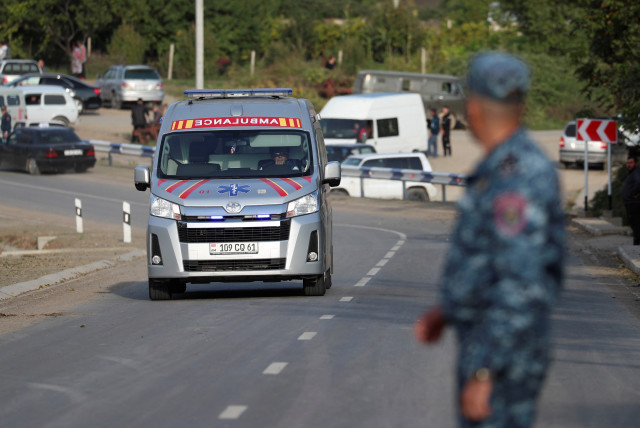Russia, US trade blame for ethnic cleansing in Nagorno-Karabakh

Thousands of ethnic Armenians fled the breakaway region of Nagorno-Karabakh by Monday after their fighters were defeated by Azerbaijan.
Moscow and Washington have accused each other of destabilizing the South Caucuses region, as thousands of ethnic Armenians fled their homes in Nagorno-Karabakh over ethnic cleansing fears.
"We urge Washington to refrain from extremely dangerous words and actions that lead to an artificial increase in anti-Russian sentiment in Armenia," Russia's Ambassador to the United States Anatoly Antonov said on the Telegram messaging app on Tuesday.
Antonov's comments follow the US State Department spokesman saying on Monday that Russia had shown it was not a reliable partner after Armenia blamed Moscow for failing to intervene in last week's capture of Nagorno-Karabakh by Azerbaijani forces.
Since the breakup of the Soviet Union, Armenia has relied on a security partnership with Russia, but relations between the two countries have frayed badly since President Vladimir Putin launched the invasion of Ukraine in 2022.
"I do think that Russia has shown that it is not a security partner that can be relied on," US State Department spokesman Matthew Miller told reporters.
Ethnic Armenians will leave Nagorno-Karabakh
Thousands of ethnic Armenians fled the breakaway region of Nagorno-Karabakh by Monday after their fighters were defeated by Azerbaijan in last week's lightning military operation.
Baku has promised to protect the rights of the roughly 120,000 Armenians who call Karabakh home but many refuse to accept its assurances. Armenia's Prime Minister Nikol Pashinyan blamed Russia for failing to ensure Armenian security.
Washington and a number of its Western allies condemned the Azeri hostilities, which have changed the contours of the South Caucasus - a patchwork of ethnicities crisscrossed with oil and gas pipelines where Russia, the United States, Turkey and Iran vie for influence.
Moscow has said Armenia only had itself to blame for Azerbaijan's victory over Karabakh because it flirted with the West rather than working with Moscow and Baku for peace.
On Monday, US Agency for International Development (USAID) chief Samantha Power and US State Department Acting Assistant Secretary for Europe and Eurasian Affairs Yuri, arrived in Armenia, in the first visit by senior US officials since the Karabakh Armenians were forced into a ceasefire last week.
From 1988-1994 about 30,000 people were killed and more than a million people, mostly ethnic Azeris, displaced as the Armenians threw off nominal Azerbaijani control in what is now known as the First Karabakh War.
Azerbaijan gained back territory in and around Nagorno-Karabakh in a second war in 2020, which ended with a Moscow-brokered peace deal and the deployment of a contingent of Russian peacekeepers.
Turkey, who backed Azerbaijan with weaponry in the 2020 conflict, said last week it supported the aims of Azerbaijan's latest military operation but played no part in it.
Jerusalem Post Store
`; document.getElementById("linkPremium").innerHTML = cont; var divWithLink = document.getElementById("premium-link"); if (divWithLink !== null && divWithLink !== 'undefined') { divWithLink.style.border = "solid 1px #cb0f3e"; divWithLink.style.textAlign = "center"; divWithLink.style.marginBottom = "15px"; divWithLink.style.marginTop = "15px"; divWithLink.style.width = "100%"; divWithLink.style.backgroundColor = "#122952"; divWithLink.style.color = "#ffffff"; divWithLink.style.lineHeight = "1.5"; } } (function (v, i) { });

